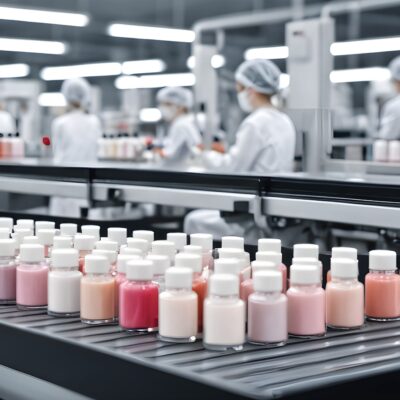
Indie Beauty Brand Founders On Finding The Right Fulfillment Partners
In this edition of Beauty Independent’s ongoing series posing questions to beauty entrepreneurs, we ask 10 founders and executives: How did you choose your fulfillment partner?
- Carson Meyer Founder, C & The Moon
I got lucky and was introduced early on to ShipRelay Fulfillment. They spent hours on the phone with me walking me through every little aspect of their services and the role they would play in my business. They approach each obstacle with urgency and diligence. As a new brand, I feel well taken care of and valued as a client.
- David Simnick CEO and Co-Founder, Soapbox
We have had the pleasure of working with a couple great 3PL's on the direct-to-consumer side, and we have an amazing relationship with Emerson Group. Emerson is a national broker who not only represents your line to customers, but also combines your business in with other brands they represent under the same vendor number so you don't have to set up vendor paperwork every time you start launching products with a new retail partner.
We also ship under that same vendor number with serious brands that Emerson represents. It's a wonderful service that cuts down on freight cost as well as simplifies the whole order-to-cash-process for rapidly growing brands.
- Sally Olivia Kim CEO, Crushed Tonic
We had such a crazy time finding and sticking with the right fulfillment center. We actually moved three times in one year. As a small brand, it’s important that you partner with a center that will have time for all of the ups and downs your brand will face. Otherwise, because big fulfillment centers are automated from their back end, they might not be able to react to the changes your brand needs in time.
For fulfillment centers, I recommend that the brand asks their manufacturers which partners they recommend, especially if there are any local products. Lead times are so long when it comes to manufacturing, so it’s really the best-case scenario if the product can be moved from the manufacturer to the fulfillment center quickly and in less than a day.
- Jennifer Goldman CEO, Essential Rose Life
I am currently sourcing manufacturing and fulfillment houses, and there are many obstacles At first, I found a location that could provide full turn-key services: manufacturing, filling, and shipping in-house with no minimums. I wanted to jump on this ASAP because it seemed perfect. Well, because they were offering so many services at once, many things fell through the cracks. I am finding it's better to choose places that specialize in one service (manufacturing or shipping), even if it means the process is more expensive overall.
I am also finding it really matters how long the company has been in business. The above company I mentioned has only been in business for three years, which was reflected in their lack of processes and organization. Moving forward, I will only be working with companies that have been in business for longer periods of time - 10 years or more - and who are organized from the start in all aspects of their intake procedures.
- MacKenzie McClain Hill Founder, LumiBloom
As a relatively young company still early in our growth cycle, we made the decision to keep our fulfillment in-house. For a short time, we did have an outsourced fulfillment operation. What we learned is that until you are large enough to support a dedicated team capable of quality control oversight as part of outsourcing fulfillment, it can be a bumpy ride.
Our business philosophy and brand promise includes building a strong relationship with our customers. Having their products arrive on time and beautifully presented is an important part of that relationship and promise. It is so fundamental to what we do that we prioritize fulfillment the same way we prioritize product sourcing. We control every aspect of it so that we are sure we can stand behind the customer experience.
As we continue to scale and grow, we will have to turn the process over to a larger corporate facility. But, when we do, we know that we will have to establish a partnership relationship with the provider, provide excellent training, tools and oversight to ensure consistency and the exceptional experience that we are determined to create for people that purchase our products.
- Natasha Jay Founder, Pump Haircare
This is one of the most important strategic issues in my business. I actually don't use an outsourced fulfilment house and, instead, keep the fulfilment very close to my own desk, literally. In a previous e-commerce business, I used 3PL, so I know the pros and cons. Managing this in-house is a huge competitive advantage for Pump.
We communicate customer requests in real-time and in-person to the girls who pack orders. Lots of customers message us on Messenger, for example, asking for last minute order changes. We accommodate them all. No outside 3PL fulfillment house can do that. I can also make sure that the orders are packed in a way that makes the unboxing part of the purchase experience for customers. The way my team packs our orders leaves customers feeling like they’ve received a pretty gift for themselves.
- Trisha Watson Founder, Trisha Watson Organics
Our order fulfillment is done in-house from our staffed shipping department. This offers control over products, allows us to be more in touch with customer needs and is helpful when customizing a customer's package with skincare samples, specialized thank you cards, business cards, promo codes and more. When choosing a fulfillment center, if needed, I would look for dedication to the client, customer service and physical proximity to the customers.
- Laura Stearn CEO and Founder, Just Pure Essentials
I have interviewed a few fulfillment houses over the years, and gone back and forth over whether we should contract out our fulfillment. Upon starting up the business and getting picked up by some major nationwide natural grocer distributors, I was hoping that we’d be selling volume off the bat. That was not the case, as I soon found out. Distributors are pretty much just warehouses that handle logistics. They do virtually zero selling, putting all that burden back on us, the vendors. So our initial product movement beyond the opening PO was a slow build based upon what we could accomplish by reaching out to buyers one by one. So, we kept our fulfillment in-house.
A couple years later, we decided to research again fulfillment houses to perhaps outsource that part of our business. There are all kinds of fulfillment houses, automated by machines or packed by people, all with different methods and prices. But, in the end, we decided to keep our fulfillment in-house, so we wouldn’t be overpaying for monthly minimums when we have slower months and, also, more importantly, so that we can maintain that personal touch and make sure every customer box is packed beautifully with tissue, include free samples that are specifically selected for each customer based upon their order and order history, and a write a thank you by hand on every invoice.
So far, it is still manageable and more cost effective for us to do in-house rather than outsource, and we keep control of our product, inventory, packing and customer service.
- PETER SCHAFRICK Founder, Schaf Skincare
We fulfill on our own for all purchases made from our website. Most days, it’s manageable, but our challenge is trying pack and ship orders when it gets really busy. To combat this, I enlist my kids to help. It’s very cheap labor! But I do try and make it fun for them, and they get a better understanding of how our business operates.
Our outside fulfillment house serves our wholesale accounts. I partnered with them because they represent all-natural/green brands exclusively, and they were able to immediately use their relationships to secure new retailers for us. But, with any new relationship, we had some hiccups along the way, which were mainly administrative. Working with larger organizations means having to integrate with their systems and ensure proper procedures are followed, which entails a lot more paperwork.
Another challenge we faced was stock forecasting. The first six months were difficult for us both. They had difficulty predicting order volumes and also which SKUs would sell better. In turn, I had difficulty anticipating how many units to produce. As we started to scale, I learned to not only increase my production numbers, but also to ensure our warehouse was never out of stock. Running out of stock is far worse that having a bit extra stock on hand.
- Katherine Ragusa Co-Founder, Lab to Beauty
We decided to do all of our shipping and logistics internally because we wanted to be able to ensure our products were being handled and delivered with the utmost care, at all times. We did not want to use a third party. We ship and fulfill all of our Lab to Beauty products from Tony Walker & Co.
Lab to Beauty was developed in my family's retail petri dish, Tony Walker & Co, to establish true product performance, efficacy and marketability. In this living lab, the collection sits alongside La Mer, Kiehls, Estee Lauder, Caudalie, Tata Harper and more.
If you have a question you’d like Beauty Independent to ask beauty entrepreneurs, please send it to editor@beautyindependent.com.






Leave a Reply
You must be logged in to post a comment.